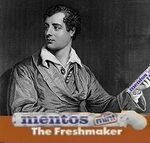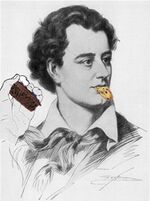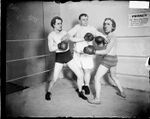Lord Byron
George "Flash" Gordon Byron XII aka The Byronic Man, aka Mr. "Scandalous Bisexual Affairs", more commonly known as Lord Byron, was a landlord, poet, world uncycling champion, crack addict, dolphin trainer, cross-dresser, community college graduate, and, most notably, Oscar Wilde's fiercest rival.
Childhood
Byron was born in West Stabbing, Nubia, on January 13th, 1813, which eerily enough is the same date that Walker, Texas Ranger (which is said to have gained inspiration from Byron's works) was cancelled 190 years later. Early on he was stricken with a bad case of ass flu, which was crushed by Margaret Thatcher with her bare hands (not to be confused with her bear hands). Byron survived through such heartbreak as his struggles with mime attacks, his dyslxeia, and his mother/father Fredina's multiple sex changes (which is said to be the inspiration for his poem Manfredish). Eventually he graduated from San Diego Community College with a degree in bleariness.
Rise of Byron
Byron became noticed in the artistic community with his many appearances in Mentos commercials, which he also wrote the jingles for:
- Who killed John Keats?
- "I," says the Quarterly,
- So savage and Tartarly;
- "Twas one of my feats."
- Mentos: the Freshmaker!
Eventually his work gained so much notice that was recruited by noted poet dEaThs33ker_20, whose Xanga entries are often considered to be classic. Byron worked under _20 for 7 months, and became poet laureate of the Intarweb after _20's ironically unexpected death.
Notable works
Although his epic Don Juan and the less-appreciated sequel Don Juan 2: The Quickening are his most-known works, he also compiled a large list of poetry.
- To a beautiful Quaker Oatmeal bar
- The Chameleon
- Beppo the Hippo
- Citizen Cain
- 867-5309
- 9 Tips to finding his Pleasure Zone (Cosmo article)
Criticism
Byron is considered the 1337est romantic poet of his day. He often appealed to young readership, as evidenced in his poem OMGWTFBBQ:
- R4m3mb3r th33! r3m3mb3r teeh!!!!111one
- t!11 137h3 qu3n<|-| 1!f3's 8ur/\!/\g 57r33m
- R3/\/\0r53 and 5h4m3 5h411 <1!ng to 7h33,
- And h4un+ 7|-|33 like a f3\/3r!5h dream!!!???/
This poem is widely considered to symbolise the struggles that youth go through in the struggle to find meaning in life, especially when some n00bs are camping like a bunch of homos.
However, Byron went through a puzzling Radical Phase, where unusual and inflammatory statements infested otherwise good poetry, as seen in "And Thou Art Dead, Mothaf*cka":
- And thou art dead, as young and fair
- As aught of mortal birth;
- And form so soft, and charms so rare,
- Too soon return'd to Earth!
- Though Earth receiv'd them in her bed,
- And o'er the spot the crowd may tread
- In carelessness or mirth,
- There is an eye which could not brook
- A moment on that grave to look.
- Fug the po-lice.
and "She walks in Booty":
- She walks in boo-tay, like the night
- Of cloudless climes and starry skies;
- And all that's best of dark and bright
- Meet in her aspect and her eyes:
- But she ain't givin' me the ho'in' I need
- Is Lord Byron gonna have to slap a bitch?
It was during this phase that Byron acquired his crack addiction. His style heavily influenced by Marilyn Manson's early works. He also discovered the umlaut, and quickly started abusing it in its endovenous form.
- ÐâRKÑ맧
- í HâÐ â ÐRëâM, WHíÇH W⧠ÑôT ⣣ â ÐRëâM.
- THë ßRíGHT §úÑ W⧠ë×TíÑGúí§H'Ð, âÑÐ THë §TâR§
- ÐíÐ WâÑÐëR ÐâRK£íÑG íÑ THë ëTëRÑ⣠§þâÇë,
- Râݣ맧, âÑÐ þâTH£ë§§, âÑÐ THë íÇÝ ëâRTH
He later recovered in his "Happy Phase", in which he wrote the following:
- I'm gonna soak up the sun
- Gonna tell everyone
- To lighten up (I'm gonna tell 'em that)
- I've got no one to blame
- For every time I feel lame
- I'm looking up o I'm gonna soak up the sun
- I'm gonna soak up the sun
While this poem became the #1 Summer Jam of 1824, critics usually call it "amateur" and "uncharacteristic of Byron's previous works".
His letter to best buddy and rumoured gay lover Thomas Moore best summarised his plight:
- My Dearest Thomas:
- Why do all these crackers have to be all up in my grill? Lord Byron gotta be Lord Byron, you know? I do what I need to do. Oh, and tell that fool Oscar Wilde if he ever shows up on my turf again, I'm gone bust a cap in his jive ass.
- With love,
- Lord Byron
- P.S. We still on for tonight?
The Byronic Hero
The Byronic Hero is two pounds of thinly sliced turkey, honey-glazed ham, cannabis, salami, marijuana, and cheese on rye and is typically served with some of those cute party toothpicks with little olives on the end. It is usually characterised by rebellion and a distaste for society, yet a haughty appreciation for tasty lunchmeats and hallucinogenic drugs.
Death
Lord Byron was killed on May 25, 1840, in a pistol duel with Oscar Wilde at Wilde's East London apartment in what was promoted by Don King as the "Spat in the Flat".
Sightings of him in the Himalayas wearing a fur coat should be completely ignored unless you see him there, in which case contact the nearest asylum and yell "I AM JOSEPHINE!!!" really loud.
| |||||||||||||||||||||||
| Featured version: 20 June 2005 | |
| This article has been featured on the main page. — You can vote for or nominate your favourite articles at Uncyclopedia:VFH. | |




